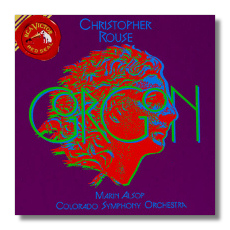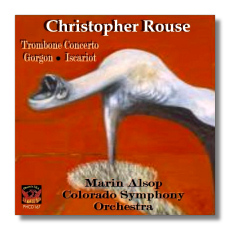
The Internet's Premier Classical Music Source
Related Links
- Rouse Reviews
- Latest Reviews
- More Reviews
-
By Composer
-
Collections
DVD & Blu-ray
Books
Concert Reviews
Articles/Interviews
Software
Audio
Search Amazon
Recommended Links
Site News
 CD Review
CD Review
Christopher Rouse

Gorgon
- Trombone Concerto
- Gorgon
- Iscariot
Joseph Alessi, trombone
Colorado Symphony Orchestra/Marin Alsop
RCA Red Seal 90926-68410-2
Reissued on Phoenix USA PHCD167:
Amazon
- UK
- Germany
- Canada
- France
- Japan
- ArkivMusic
- CD Universe
Summary for the Busy Executive: Two-and-a-half cheers.
Since my friends know me as a new-music fan, they often ask me how I can waste my time with such stuff. "Show me one new composer as good as Beethoven" is a dare I hear quite a lot. Of course, any composer I might name will likely provoke a snort from someone in that frame of mind. As a matter of fact, I can't name any composer as good as Beethoven – or Bach, Brahms, Berlioz, Berwald, Bartók, Bacewicz, or Berg, for that matter. There is, after all, only one of each of these. It's never a question to me of "as good" but "how compelling," and each of these artists compels in his own way. Implicit in my friends' rebuke is the notion that I should spend my time only among the very best. But after at least 600 years – from at least Machaut on – the best is a either a very large category or a very small one. If you can always rank one composer over another and one work over another, you end up listening to just one work. Fortunately, it's two large "ifs."
How does one decide the value of a new piece? Even better, how does one decide the value of any piece? What do we mean by "value?" What do we mean by "decide?" I realize I will raise hackles here, but I find the Temple of Art notion – the Pantheon that expresses worth for all time – a bit naïve and more than a little harmful. If there were such a thing, the task of deciding those worthy to enter would be a grave one indeed, and it would force upon us the responsibility of coming up with universal standards. I've never been able to get anyone to tell me even one of these, so we might as well just admit our moral bankruptcy and close up shop until the Messiah comes. But the priests of the temple insist that such standards exist and act as if they knew them. If they closed the doors, after all, they'd have nothing to do or to listen to. On the other hand, I note that music history is filled with the rise and fall and rise again of reputations. Consider that Bach, Haydn, Mozart, Beethoven, Berlioz, Brahms, Wagner, and Mahler have all at one time dwelt in outer darkness. This means that, fortunately, humans change their minds. Consequently, any value we assign is subject to a change of mind, and, since it's our mind, the value is primarily personal, though it might be shared. The priests fall into the danger that while they scurry to keep out the unworthy, they keep themselves apart from the possibly worthy that happens to be outside. I, on the other hand, run the risk that I distrust the act of judging itself and thus have no reason to prefer anything to anything else. I could spend the rest of my days listening to "How Much is That Doggy in the Window" over and over again. It becomes very important to both me and the hierophants that we state the reasons that support our judgement as clearly and specifically as possible.
Any piece of music connects to me first on some emotional level. It doesn't have to be an exalted emotional level, since I don't always find myself in that state of mind. Music speaks to my whole life, not just a part of it. Ordinary pleasure can satisfy me as much as yearning for the infinite. A vision of heaven is nice, but probably a once-in-a-lifetime deal. Really good Nova lox on a bagel with home-made cream cheese and maybe a shave of red onion will do for me until heaven chooses to reveal itself. I suspect that angels, if they exist, envy us.
All that said, Iscariot left me stone cold. Beyond the opening thunderclap of the drum, no musical idea held, let alone caught, my attention. Of course, you can take the craft for granted – decent string writing, new, workable orchestral sonorities, etc – but this is the stock kit bag of most conservatory composition grads. Furthermore, what I call the "narrative" of the piece – the way the piece progresses, as a story or a speech might progress – hid from me. The effect was like listening to some guy mumbling – unusual, since Rouse always struck me as a composer of clear ideas.
Gorgon, on the other hand, shows Rouse's composing virtuosity. It dares much. The music gets in your face and assaults you, in a way that reminded me of Phil Spector's "wall of sound," with the volume turned way up. Imagine getting slapped for a quarter of an hour. It almost doesn't let up, except for extremely brief passages between the three main movements. Even a lower dynamic doesn't relieve the super-Bartókian intensity of the music. The composer takes a tremendous risk writing a 17-minute gonzo attack. Listeners might either turn off immediately or let their minds wander out of sheer self-defense. I found myself trying to break away, but the music wouldn't let me go. Rouse pushes dynamic near-stasis and machine-gun rhythms almost to the line of aesthetic nullity, but he always knows how close he can hug it without stepping over. To me, Rouse has achieved something brilliantly individual.
Even better, the major work on the disc, different in musical substance from the other two, is the most recent, a sign that Rouse continues to try new things and to grow as a composer. For some reason, not too many composers have tried their hand at trombone concerti and seem to prefer the far more temperamental French horn. Perhaps the lack stems from the dearth of "star" virtuosi, or perhaps from the comedy associations of the instrument. I unhesitatingly call Rouse's trombone concerto one of the two finest I've heard – the other being Bloch's late masterpiece Symphony for Trombone and Orchestra – but I admit it's not a large field. Nevertheless, both Rouse and Bloch have written two powerful works. The liner notes by Mark Swed, perceptive and brilliantly concise, both argue the case for the work vividly and illuminate the music. The piece works on several levels: as a concerto and dramatic-abstract composition, as a requiem for Leonard Bernstein (the "believe" motif from the "Kaddish" Symphony pops up at key points), and as a "depiction" of faith vs. doubt. The work shows great ambition and reach and to me succeeds totally. The idiom belongs to Rouse alone, and it's a curious blend of classic Modernism and contemporary techniques, particularly in the ways it controls time – either with regular tactus or beat (Modernism) or with a post-war blur of time and space, of a specified rhythmic, quasi-chaos or stasis, common in work of the 60s and 70s. The individuality of expression reminds me to some extent of Barber and of Bloch. Whatever influences Rouse may have appropriated he has absorbed and transformed. In themselves, they no longer matter. To me, this constitutes the greatest achievement of the concerto, because it frees Rouse to call on traditional expressive gestures without the taint of knock-off. For example, the progress of dark to light comes out musically as low to high. The memorial aspect of the work comes out, not only in the musical reference to Bernstein's symphony, but in a Mahler (and incidentally Bloch) funeral cortege – a stunningly poetic tribute to one of Mahler's great champions. The music itself, however, isn't either Mahler's or Bloch's, and thus impresses upon us its great allusive power without having to impersonate someone else's voice. Even the apotheosis of Bernstein's theme, when at the end it sounds unmistakably in more-or-less its original harmonies, the key phrase is "more-or-less," and the music comes from more complex emotional country than even Bernstein's yearning for belief in his symphony. It sounds more distant, even more acidic, through Rouse's minimal orchestral changes. Rouse seems to sympathize with but simultaneously stand apart from the possibility of belief.
Of course, one can't begin to talk this way about a score lacking in craft. The craft deepens and clarifies the expression. American music seems to have entered a particularly lucky period, with composers like Rouse, Kernis, Adams, Reich, Rosner, Larsen, and Weigel all going their separate ways and bringing back gold.
Alessi and Alsop do well for a first recording, but the music really needs – and can sustain the wear of – a lot of performances and by first-tier organizations. The Colorado players are mostly there and Alsop certainly has the broad picture of Gorgon and the concerto. The devil is in the details, where the rhythm goes slightly fuzzy (particularly in the concerto's scherzo) or the forward impulse briefly falters. I'm no judge of trombone playing, so I hesitate to criticize Alessi. I can say that while he plays the notes, it's the music and the concept that excite me, rather than him as protagonist. It's like watching a capable Hamlet. Still, a fine effort all around.
Copyright © 1998, Steve Schwartz




















